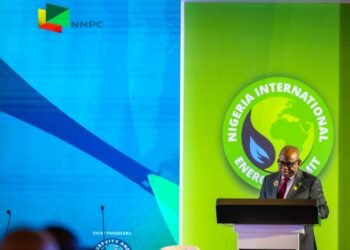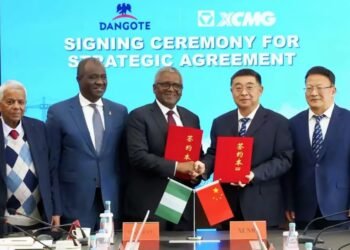President Bola Tinubu has disclosed that his administration has attracted more than $30 billion Foreign Direct Investments (FDIs) in the last one year.
The president further said the FDIs so far recorded was a reflection of the confidence foreign investors reposed in the national economy in the past year.
This was as Comptroller General of Customs (CGC) Adewale Adeniyi said the Nigeria Customs Service (NCS) has met its 2024 revenue target, collecting ₦5,079,455,088,194.38 as at 12 November, 2024, with more than a month remaining in the fiscal year.
The president and the CGC made the disclosures in their speech and remarks, respectively, at the opening ceremony of the 2024 Comptroller General of Customs Conference, held at Transcorp Hilton Hotel, Abuja, on Wednesday.
The 2024 CGC Conference has the theme, “Nigeria Customs Service: Engaging Traditional And New Partners With Purpose”.
President Tinubu’s speech
The president said his administration, 16 months ago, began with a clear and unwavering vision -to strengthen Nigeria’s economic base and deliver positive growth and development for the benefit of all Nigerians.
“This vision remains unchanged. In pursuing this vision, we have built upon existing foundations while introducing necessary reforms to adapt to our evolving economic realities.
“Our focus has been on strengthening what works, refining what needs improvement and introducing new initiatives where gaps exist.
“We recognised that certain economic policies, though useful in their time, needed to be realigned with current global economic dynamics to better serve our national interests and the wellbeing of all Nigerians.
“In pursuit of this vision, we embarked on bold yet necessary economic reforms. Working with expert advice and careful consideration of our unique circumstances, we implemented strategic policy adjustments to strengthen our economy.
“The removal of fuel subsidy and unification of our exchange rate system were crucial steps toward building a more transparent and sustainable economic framework.
“While these decisions required short-term adjustments from all Nigerians, they were essential to redirect our resources toward productive investments that will yield long-term benefits for our people.
“These reforms have already begun showing positive results, setting the stage for sustainable economic growth and improved prosperity for all Nigerians.
“Building on these foundational reforms, we have expanded our focus to strengthen Nigeria’s position in global trade and investment.
“Through strategic initiatives, we are enhancing trade facilitation, modernising our port infrastructure, and streamlining business processes to reduce barriers to trade.
“Our commitment to creating an enabling business environment has resonated with the international investment community.
“The confidence in our economy is reflected in the significant surge in foreign direct investments, which has exceeded $30 billion in the past year.
“This achievement demonstrates that our policies are yielding positive results, making Nigeria increasingly attractive for both domestic and international investors,” Tinubu said.
The president added that, more importantly, the improvements were creating new opportunities for Nigerian businesses to participate more actively in the global trade.
He said the role of our strategic institutions and their dedicated personnel were central to the success of the economic initiatives.
“Our vision required government agencies to be proactive in aligning their statutory responsibilities with the broader national economic objectives.
“Agencies needed to demonstrate initiative in identifying opportunities within their mandates that would best serve and advance our national aspirations.
“I am pleased to note that the NCS is one of the agencies that has risen to this expectation, demonstrating how government institutions can effectively contribute to our economic transformation agenda while fulfilling their core mandates.
“This alignment is clearly demonstrated in the Service’s comprehensive modernisation agenda.
“In responding to our administration’s call for enhanced trade facilitation and economic growth, the Service has introduced significant reforms, including the Advanced Ruling System and the Authorised Economic Operator Programme.
“These initiatives, which align with global best practices, show how agencies can innovatively implement solutions that advance our national economic objectives while meeting international standards.
“Such reforms not only enhance trade facilitation but also create a more predictable business environment that supports our broader economic goals.
“The results of these initiatives across the Service core mandates have been encouraging. The NCS has shown remarkable progress in revenue generation, enhancing government’s capacity to fund critical national development projects,” he said.
Tinubu further said NCS, through strategic reforms, was strengthening Nigeria’s position as a trade-friendly nation, particularly in the areas of export promotion and port efficiency.
He said this has contributed significantly to Nigeria’s improved global ranking in the ease of doing business.
He said NCS has also demonstrated that effective trade facilitation can coexist with strong regulatory compliance, as evidenced by its enhanced border security and anti-smuggling operations.
“These achievements affirm our administration’s belief that public institutions, when properly aligned with national objectives, can effectively drive transformative change.”
President Tinubu described as fitting the theme of the conference, saying it reflected the broader vision of his administration of fostering strategic partnerships and collaborative approaches to governance and economic management.
He said his administration remained committed to supporting the NCS in its modernisation and reform initiatives and providing the necessary policy backing and enablement required to strengthen its capacity to deliver on its mandates.
“As you convene for your deliberations over the next few days, I urge you to build upon these foundations with clear cognizance of our regional and continental obligations.
“Your discussions should be particularly timely and strategic, considering Nigeria’s role in the African Continental Free Trade Area (AfCFTA) and our position as West Africa’s largest economy.
“Focus on innovative approaches that will strengthen existing partnerships and forge new ones to advance our national interests within this expanding trade landscape.
“Your deliberations should chart a path for enhancing our trade processes and compliance frameworks in ways that position Nigeria to maximise the opportunities presented by regional and continental integration while maintaining robust border security.
“The NCS, as a key facilitator of international trade and guardian of our borders, will continue to play a fundamental role in advancing our national economic objectives,” he added.
Remarks by CGC Adeniyi
Earlier in his remarks, CGC Adewale Adeniyi said the gathering at the FCT exemplified the power of unity and perfectly mirrored the mission to bring together traditional and new partners of the NCS.
He spoke on the commitments made at a gathering in Lagos, one year ago, noting that the commitments marked a turning point in the approach of the NCS to partnership, not just as a document of promises, but as a blueprint for transformation.
“Today, I stand before you to demonstrate how those commitments have evolved into tangible achievements.
“Our pledge was comprehensive and ambitious: modernising our processes through a one-stop solution for cargo alerts, revolutionising our ICT infrastructure, streamlining examination procedures, and embracing automation for enhanced efficiency.
“We committed to reimagining our free trade zone operations, elevating cargo integrity standards and expanding our scanning capabilities.
“Above all, we promised to usher in a new era of customs operations one built on transparency, efficiency and genuine collaboration with our partners,” he said.
According to the CGC, the successful implementation of the measures was made possible through support from President Tinubu; guidance of the Minister of Finance and Coordinating Minister of the Economy and Chairman of the NCS Board, Mr. Wale Edun; commitment of the NCS Management Team and its dedicated officers and men; and constructive engagement of its stakeholders.
“Together, we have created a more business-friendly trading environment that aligns with President Tinubu’s economic transformation agenda while strengthening our capacity to protect Nigerian citizens from illicit trade.
“In pursuing these objectives, we expanded the frontiers of our engagement, both within and beyond Nigeria’s borders.
“This past year has seen us not only consolidating existing partnerships but also forging new alliances crucial to our mission.
“We have deliberately repositioned the NCS brand, emphasising our commitment to trade facilitation and demonstrating a more nuanced application of our authority in executing our statutory responsibilities.
“Through extensive stakeholder enlightenment programmes, we have opened windows into our operations, fostering better understanding of our procedures and requirements.
“This renewed approach to partnership has led to the strengthening of existing agreements and the establishment of new ones, all aimed at creating a more collaborative and efficient trading environment.
“These strategic engagements and collaborative approaches have yielded remarkable results across our core statutory responsibilities.
“I am pleased to announce that yesterday, 12 November, 2024, at exactly 13:10 Hrs, the NCS hit its 2024 revenue target of ₦5.07 trillion, collecting ₦5,079,455,088,194.38 with more than a month remaining in the fiscal year.
“This exceptional performance projected to exceed our target by 10 per cent validates our partnership-driven approach to revenue collection and trade facilitation.
“The achievement is not merely about numbers: it demonstrates how enhanced stakeholder collaboration, improved processes, and modernized systems can deliver tangible results for our nation’s economy.
“Our commitment to trade facilitation has garnered significant recognition and yielded measurable results.
“The Service’s leap of 33 places upward in the Presidential Enabling Business Environment Council (PEBEC) rankings, placing us among the top five agencies in trade facilitation, reflects the impact of our reform initiatives.
“This improvement goes beyond metrics it represents real changes in how we facilitate trade across borders.
“We have expanded our focus beyond traditional import operations to actively support exporters and nurture small and medium scale enterprises.
“The AfCFTA Secretariat’s recognition of our innovative approaches led to an invitation to share Nigeria’s experience at the prestigious Biashara Afrika forum in Kigali last month.
“This recognition culminated in a historic milestone Nigeria’s first shipment under the AfCFTA Agreement, marking our country’s practical commitment to continental trade integration.
“The momentum of our modernisation initiatives continues to build yielding immediate benefits for our stakeholders. With your support and collaboration, we have successfully implemented several key reforms.
“Our Authorised Economic Operators (AEO) scheme now has six beneficiaries in its pilot phase, carefully selected based on stringent compliance criteria.
“The Advanced Ruling System has processed 31 requests, with 12 rulings issued -notably, 75 per cent of these were completed in October following our stakeholder sensitisation efforts,” Adeniyi said.
He said, in fulfilling its enforcement mandate, NCS has achieved unprecedented success in protecting both the citizens and the economy.
“The scale of our intervention is reflected in seizures valued at ₦28.1 billion and counting in 2024 alone. These seizures span critical areas of national concern from wildlife items and arms and ammunition to narcotics and pharmaceutical products.
“A important moment in our enforcement strategy was the declaration of a state of emergency at our major ports, which led to the interception of 48 containers of illicit pharmaceutical items and narcotics, significantly disrupting the flow of potentially harmful products.
“Through strategic operations, we continue to intercept and seize prohibited items that pose direct threats to public health and safety.
“Our enforcement activities have been particularly impactful in addressing items that could worsen our current economic challenges.
“A standout example is Operation Whirlwind, launched in collaboration with the Office of the National Security Adviser (ONSA) and the Nigeria Midstream and Downstream Petroleum Regulatory Authority (NMDPRA).
“This joint initiative to combat petroleum product smuggling demonstrates how inter-agency cooperation can effectively protect our national resources and economic stability.
“The success of these operations underscores a crucial lesson: when agencies work together with shared purpose, we multiply our effectiveness in safeguarding national interests.”
He however acknowledged the challenges that the NCS faced in the last one year, noting that a primary concern was the misconception of its role amid monetary policy changes
Adeniyi said some stakeholders viewed the actions of the NCS as trade-restrictive, rather than recognising its enhanced commitment to trade facilitation.
“Additionally, we continue to grapple with widespread non-compliance among the larger population of traders who, though numerous, contribute relatively smaller portions to our trade volumes, values and revenue.
“These external challenges have required us to intensify our stakeholder engagement and compliance initiatives,” he said.
The CGC also identified the unprecedented rate of leadership transitions within the Service as one significant internal challenge that must be addressed transparently
“The statistics tell a compelling story: We saw 60 per cent of our management team exit in 2022, 36 per cent in 2023, and this year, we will experience a 76 per cent change in our management composition.
“With projections indicating another 40 per cent of our management staff retiring in 2024, we recognise the urgent need for strategic intervention,” he said.
The CGC however disclosed that, to tackle the challenge, NCS has launched “an ambitious Human Resource Development Plan that addresses both immediate and long-term needs.
“This includes accelerated career progression opportunities for deserving officers, ensuring that talent and dedication are appropriately rewarded.
“Most significantly, we are making a historic investment in human capital infrastructure through the establishment of a Customs University -a testament to our commitment to building a knowledge- driven service.
“These initiatives, aligned with the World Customs Organisation‘s (WCO) focus on youth leadership development, complement our comprehensive talent management program that identifies and prepares promising officers for leadership roles, ensuring the Service’s continued stability and effectiveness.
“This period of transition, while challenging, presents us with unique opportunities to reshape our future,” CGC Adewale Adeniyi added.






























